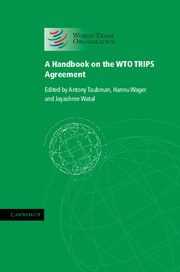Book contents
- Frontmatter
- Contents
- Figures
- Boxes
- Tables
- Preface
- Acknowledgements
- Acronyms and abbreviations
- I Introduction to the TRIPS Agreement
- II Copyright and related rights
- III Trademarks
- IV Geographical indications
- V Patents
- VI Industrial designs, layout-designs of integrated circuits, undisclosed information, anti-competitive practices
- VII Enforcement
- VIII Dispute prevention and settlement
- IX TRIPS and Public Health
- X Current TRIPS issues
- Appendix 1 Guide to TRIPS notifications
- Appendix 2 Guide to TRIPS documents
- Annexes TRIPS Handbook
- Index
IX - TRIPS and Public Health
Published online by Cambridge University Press: 05 May 2012
- Frontmatter
- Contents
- Figures
- Boxes
- Tables
- Preface
- Acknowledgements
- Acronyms and abbreviations
- I Introduction to the TRIPS Agreement
- II Copyright and related rights
- III Trademarks
- IV Geographical indications
- V Patents
- VI Industrial designs, layout-designs of integrated circuits, undisclosed information, anti-competitive practices
- VII Enforcement
- VIII Dispute prevention and settlement
- IX TRIPS and Public Health
- X Current TRIPS issues
- Appendix 1 Guide to TRIPS notifications
- Appendix 2 Guide to TRIPS documents
- Annexes TRIPS Handbook
- Index
Summary
Introduction
This chapter provides an overview of work done in the WTO on IP and public health. Chapter X briefly covers important work done in this area outside the WTO, notably in the WHO.
The TRIPS Agreement represents an attempt at the multilateral level to achieve the difficult task of balancing the interest of providing incentives for research and development of new drugs with the interest of making these drugs as widely accessible as possible to patients needing them. Consequently, in setting minimum standards for the protection and enforcement of IPRs, the TRIPS Agreement recognizes the right of countries to take various kinds of measures to qualify or limit IPRs, including for public health purposes. If a Member wants to avail itself of these flexibilities under the Agreement, it may need to implement them into its domestic law in order to be in a position to make use of them. That is, the mere recognition of these flexibilities as legal options under the international TRIPS Agreement does not necessarily mean that Members' national laws already provide sufficient flexibility. Further, the TRIPS Agreement – and the IP system more generally – is only one element of the bigger challenge of access to medicines, which also includes such important factors as the public health system in general, drug regulatory authorities, financing, health insurance, infrastructure, procurement regimes and import tariffs applied to pharmaceutical products.
- Type
- Chapter
- Information
- A Handbook on the WTO TRIPS Agreement , pp. 179 - 195Publisher: Cambridge University PressPrint publication year: 2012
- 4
- Cited by



